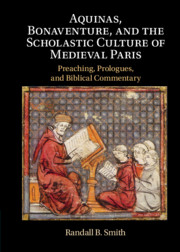 Aquinas, Bonaventure, and the Scholastic Culture of Medieval Paris
Aquinas, Bonaventure, and the Scholastic Culture of Medieval Paris Book contents
- Aquinas, Bonaventure, and the Scholastic Culture of Medieval Paris
- Aquinas, Bonaventure, and the Scholastic Culture of Medieval Paris
- Copyright page
- Dedication
- Contents
- Acknowledgments
- Introduction
- Part One Preliminaries
- Part Two Thomas Aquinas
- Part Three Bonaventure
- Appendix 1 Outlines of the Divisiones Textus of the Books of the Bible from the Inception Resumptio Addresses of Four Thirteenth-Century Masters
- Works Cited
- Index
Introduction
Published online by Cambridge University Press: 05 February 2021
- Aquinas, Bonaventure, and the Scholastic Culture of Medieval Paris
- Aquinas, Bonaventure, and the Scholastic Culture of Medieval Paris
- Copyright page
- Dedication
- Contents
- Acknowledgments
- Introduction
- Part One Preliminaries
- Part Two Thomas Aquinas
- Part Three Bonaventure
- Appendix 1 Outlines of the Divisiones Textus of the Books of the Bible from the Inception Resumptio Addresses of Four Thirteenth-Century Masters
- Works Cited
- Index
Summary
The young candidate – some thought too young – sat behind a large podium at the front of the room. To his left, seated in a long line of chairs, were the junior masters of the university; to his right sat the chancellor and all the senior masters. The previous evening had been spent responding to bachelors and masters in a complex series of “disputed questions.” But now the presiding master stood and placed on his head a biretta and said aloud: “I place on you the magisterial biretta in the name of the Father, and of the Son, and of the Holy Spirit. Amen.” The young candidate had become a master, and after birettas had been distributed to the other masters to place on their own heads, the gathered company sat down to hear the new master deliver his inaugural lecture: the principium. It was spring, 1256, and the new master was the Dominican friar, Thomas d’Aquino, the son of a minor nobleman from Italy, who had grown up in a small castle not too far from the site of the great Benedictine abbey at Monte Cassino, where the newly incepted master had studied as a youth.
- Type
- Chapter
- Information
- Aquinas, Bonaventure, and the Scholastic Culture of Medieval ParisPreaching, Prologues, and Biblical Commentary, pp. 1 - 22Publisher: Cambridge University PressPrint publication year: 2021


